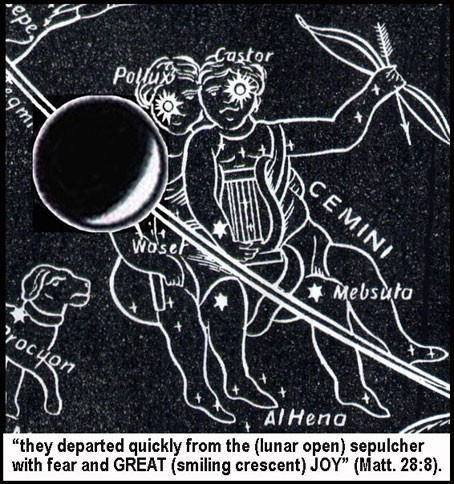
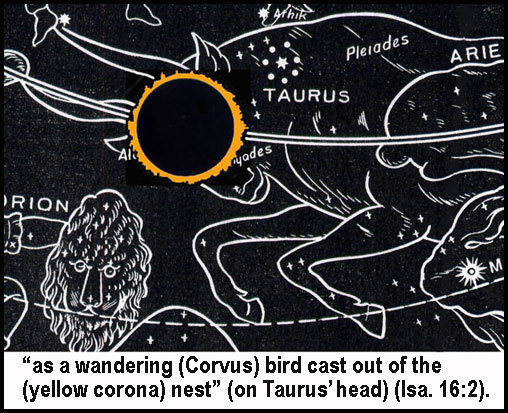
Does God Have a Sense Of Humor?
Man's Sense of Humor -- Practical Jokes that Needlessly Hurt
April Fool's Day is typical of man's FALSE sense of humor. “What seems certain is that it is in some way or other a relic of those once-universal festivities held at the vernal equinox, which ... ended on the first of April. This view gains support from the fact that the exact counterpart of April -- fooling is found to have been an immemorial custom in India. The festival of the spring equinox is there termed the feast of Huli, the last day of which is the 31st of March, upon which the chief amusement is the befooling of people by sending them on fruitless errands” (Encyclopaedia Britannica, 11th edition, Vol. 2, p. 231). This ancient practice which antedates Christianity and is nowhere mentioned in the Bible is of obvious pagan origin. God says: "Like a madman who throws firebrands, arrows, and death is the man who DECEIVES his neighbor and says, “I AM ONLY JOKING!” (Proverbs 26:18-19). God‘s Word nowhere teaches us to observe such a day of mockery, foolishness, jesting and ridicule (Eph. 5:4). This is contrary to God’s Word (Colossians 4:6; Ephesians 4:29; 5:3-4; Rom. 12:15). This sort of destructive humor can easily pervert the right sense of humor we should all have and be cultivating..
God Creates Puns By Coupling Similar Sounding Words that Have Different Meanings
In God's presence is "fullness of JOY" (Ps. 16:11) and He is a "HAPPY" God (1 Tim. 1:11). One of the fruits of His spirit is JOY (Gal. 5:22). The earth became "without form ("TOHU) and void ("BOHU")" (Gen.1:2) God said to the man and woman, "be fruitful ("PERU") and increase ("REBU") in number" (1:28) "God formed the human ("HA ADAM") from humus ("ADAMAH") (Gen.2:7,20). In Genesis 11:9 we read, "It was called Babel ('BABHEL") because there the Lord made a babble ("BALAL") of the language of all the earth." In Ruth 4:1 we read of "a certain one" ("PELONI ALMONI"). In Ruth we also read that when a man refused to take the widow and inheritance, he took off his sandal (NAAL) and gave it to Boaz thereby transferring to him the right of inheritance (NACHAL). In Isaiah 5:7 we read about "He looked for morality ("MISHPAT"), but behold, a massacre" ("MISPAH"), for right ("SEDAQAH"), but behold, a riot ("SE'AQAH"). Jeremiah 1:11-12 talks about an "almond tree " ("SHAQED") and "watching" ("SHOQED") In Amos 8:1-2 we read about "ripe fruit ("QAYITZ") and the "time is ripe" or "end" ("QETZ"). Micah 6:3-4 says "I have burdened you" ("HELETIKHAH") and "I brought you up" ("HE'ELETIKHAH"). "With the jawbone of an ass ("HAMOR") I have piled them in a mass ("HAMAR")" (Judges 15:16). "You are Rocky ("PETROS"), and on this rock ("PETRA") I will build my church" (Matt.16:18). Jesus spoke in Aramaic "You strain out a gnat ("KALMA") but you gulp down a camel" ("GAMLA") (Matt.23:24) "God is able from these stones ("ABANIM") to raise up children ("BANIM") to Abraham" (Matt.3:9). "He should be called a NAZARENE" (Matt. 2:23) because he is "a Branch" (Isa. 11:1) or NETSER. There are hundreds of wordplays in the Old and New Testaments. Doctoral theses have been written on this subject alone.
Based on the HEBREW structure and words which show up underneath the Greek, most of the gospels were composed in HEBREW first. The similarity of sound disappears in Greek. When we translate the books of Matthew, Mark and Luke back into HEBREW, we notice many word plays which were very common as a means to help the Israelites facilitate memorization: In Matthew 1:21, "You will call his name Yeshua, for he will save ("yoshia") his people from their sins." Mark 1:13 says Jesus "was with the wild beasts" ("wehayah im hahayyah"). Luke 1:46 says "My soul exalts the Lord and my spirit exults in God my Savior." ("tagdel" and "wetagel"). In Matthew 3:9 "children" is "banim" and "stones" is "abanim." In Matthew 6:12-13 and Luke 11:4 "forgive" comes from "nasa," "debts" and "debtors" from "nashah," and "temptation" from "nasah." In Mark 2:6 the scribes "sit" and "reflect": "yoshebim" "wehoshebim." In Mark 3:10 those who seek to touch ("naga") Jesus are, not the sick but those who had all types of afflictions ("nega"). In Mark 3:14-15 "to send" comes from "shalah," "to have power" comes from "shalat," and "to cast out" from "shalak." In Mark 4:6 and Matthew 13:6 the word "sun" ("shemesh") is phonetically linked to the word "root" ("shoresh"). In Mark 6:38 Jesus says to "them" ("lahem"), how much "bread" ("lechem") do you "have" ("lakem")? "Go" ... ("lekou")." In Mark 2:21 and Matthew 9:16 a "tear" or "qera" grows "worse" or "ra." In Mark 9:18 the possessed "foams" at the mouth ("weyaraq") and "grinds his teeth" ("weharaq"). In Mark 10:34 and Luke 18:32 Jesus says he will be "mocked" ("wesahaqu bo") and "spat on" ("weyarequ bo"). In Mark 11:15 and Matthew 21:12, the "tables" of the money "changers" are "shulehanot" and "shulehanim." In Mark 13:8, Matthew 24:7 and Luke 21:11 Jesus predicts earthquakes ("raashim") and famines ("raabim"). In Mark 13:21 "See here ... see there" corresponds to "hinneh hennah ... hinneh hennah." In Mark 14:11 the high priests listened ("wayyishmeu") and were delighted ("wayyismehu"). In Mark 14:16 the two disciples "leave ("wayyeseu") ... and find" ("wayyimseu"). In Mark 14:41 and Matthew 26:45 "sleep and take your rest", according to Delitzsch's Hebrew translation of the New Testament is "numu wenuhu." In Mark 14:65 to "blindfold" (the face) and to "hit" correspond to the roots "satar" and "satar", and perhaps to the very same causative form. In Matthew 9:8 the words "they saw" ("wayyiru") and "they feared" ("wayyiru") are closely associated. The same coincidence is to be found in Matthew 14:30 and 27:54 and Mark 5:15 and in John 6:19, but nowhere else in the New Testament, and therefore never in works written in Greek. On the other hand, it is found sixteen times in the Old Testament. Matthew 14:12 says, "His disciples came ("wayyiqrebu") and took the body and buried it" ("wayyiqberu"). Mark 14:34 says, "Stay and watch," but Matthew 26:38 adds "with me" to obtain "imdu" ("stay") and "immadi" ("with me"). For more, see Jean Carmignac's The Birth of the Synoptics.
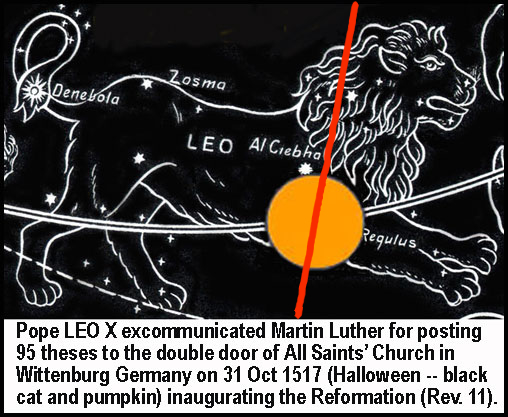
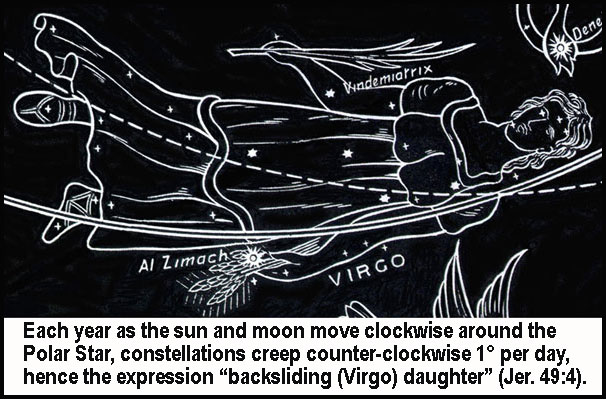
God Creates Humorous Astronomical Word-Pictures
The MILKY WAY is SPUTUM (Rev. 3:16) or HORSERADISH and ROMAINE LETTUCE (bitter herbs)(Rev.16). The STARS symbolize "SORES" on the bodies of constellations (Rev. 16:2,11), or HOLES in burnt matzah (Rev. 16). The MOON'S position in the zodiac makes it a visual part of the constellation it is travelling through. The CRESCENT is an extra "HORN" (Rev. 5:6; 9:13) on Capricorn, or a "SICKLE" (Rev. 14:14), or a two-edged "SWORD" (Rev. 1:16; 2:12,16; 6:4; 19:15,21) of Sagittarius. The MOON is a "DOOR" or "GATE" that opens (FULL) and closes (CRESCENT or NEW) (Rev. 3:7-8;20; 4:1; 11:19; 15:5; 19:11; 21:13). It is a "MOUTH" that opens (full) and closes (crescent) in a frown or smile (Rev. 12:16; 13:5). It is a sour GRAPE (Isa. 18:5). It is two cross-eyed LUNAR EYEBALLS or the RUDDER of an Argo ship (James 3:3-6) or KIPPAH (1 Cor. 11:4-5). . The SUN is a yellow BIRD'S NEST on the head of a raging (Taurus) bull (Isa. 16:2) or a dog's VOMIT (2 Pet. 2:22). Constellations "BACKSLIDE" (Virgo) by rotating and "HIDE" or are "BURIED" by rotating under the horizon. Some constellations are (Sagittarius or Aquarius) (red radius iron rod) "STIFF-NECKED". The leg of a (Coma stool) chair is actually someone's "SHOULDER" (Joshua 4:4-5) or "HAND" (Matt. 22:13). Gemini is "a double-minded man" (James 1:6-8; 4:8). We are "beside ourselves" (2 Cor. 5:13) (Castor & Pollux). The red radius line is a "line of scarlet thread in the window" which Rahab "didst let us down by" (Josh. 2:18) or a shoelace (Isa. 20:2).
The Bubonic Plague in 1356 A.D. was Jezebel's "(sick) bed," "great tribulation" (Rev. 2:22) and "I will kill her CHILDREN" (2:23). The FULL MOON in Gemini is a WHITE swollen LUMP in the groin area called a bubo. Symptoms include gangrene which causes skin tissue to turn BLACK.
The Arab Caliphate is described as (Scorpio) LOCUSTS (Rev. 9:7-9). In Hebrew the word for LOCUST is "ARBEH" and for Arab is "ARBI." "And they had tails like unto scorpions (crescent scimitars), and there were stings in their (scabbard) tails: and their power was to hurt men five months" (30 x 5 = 150 years) (Rev. 9:10).
The Ottoman Empire is described as a (lunar crescent) FOUR-HORNED (Capricorn) GOAT (Dan. 8:8) that appears at least FOUR times in Turkish history -- making its fulfillment both contemporaneous and consecutive: 1062-1453, 1281-1672, 1453-1844, and 1527-1918.There were FOUR successive waves of Turks that devastated the eastern Greek third of Europe: Togrul Beg's Seljuks, Timour's Moguls, Gengis Khan's Tartars and the Ottoman Turks. The Ottoman Empire had FOUR successive capitals: Sogut, Bursa, Edirne and Istanbul.
Luther posted the Ninety-Five Theses on the Power and Efficacy of Indulgences to the double door of All Saints' Church in Wittenburg Germany, defying Papal Rome and inaugurating the Reformation. Pope LEO X excommunicated Luther on 3, Jan. 1521.Our Lord tells us to add 3 1/2° years (Rev. 11:11), to arrive at 31st Oct, 1517 when the SUN in Leo portrays a BLACK CAT and PUMPKIN.
Emperor Phocas gave Pope Boniface III supremacy over all other churches on 19th Feb. 607 AD. Phocas was then "taken out of the way" (2 Th. 2:7) in 5 October 610 A.D. when he was killed, so the pope could usurp the emperor's secular power in the west. This is portrayed by a SOLAR ECLIPSE in Cancer (Crab): "ten horns, and upon his horns ten CROWNS" (Rev. 13:1).
The Battle of Zenta, Serbia occurred on 11 Sept. 1697 where Prince Eugene of Savoy slew 30,000 Ottomans at a cost of only 500 Austrians. He captured the Sultan's harem, 87 cannons, the royal treasure chest and the state seal of the Ottoman Empire. This resulted in an end to Catholic-Moslem wars. Also the Peace of Ryswick signed in 15th Sept. 1697 A.D. ended wars between Catholic and Protestant represented by William of ORANGE. This is portrayed as the SUN (a large ORANGE) in Sagittarius -- a "man, having on his head a golden CROWN -- 14:14),
The French Revolution is portrayed by THREE (Cancer) FROGS. Why? Because the FRENCH Revolution (plague of FROGS -- Ex. 8:3) was against the Sultan, Emperor and Pope (Pharaoh). "Liberty, Equality and Fraternity" are the FROGS' names and they give power to the people and lead to independence from these despots ("Let my people go"). The Napoleonic Code of Laws and its basic "Rights of Man" replaced the Justinian Code of Laws which didn't recognize such rights. That is why the Sultan, Emperor and Pope VOMIT the THREE FROGS out of their mouths (16:13). "Liberty, Equality and Fraternity" have no place in Tyrants' stomachs -- who get sick at the very thought of a DEMOCRATIC REPUBLIC. Both World War One and Two were Papal attempts to reverse (REGURGITATE) the FRENCH Revolution and conquer FRANCE. The Viet Nam War was a Papal attempt to conquer FRENCH Indo-China (mostly Buddhist) and make it Catholic. The "great HAIL out of heaven" (16:21) is shells, bombs and missiles.
On18th March 1974 most Arab oil producing nations ENDED their EMBARGO against the U.S.; and 8th June 1974 Saudi Arabia agreed to sell oil only in U.S. "PETRO-DOLLARS" in exchange for U.S. military protection. This is portrayed by the SUN in Ophiuchus-Hercules -- "angel come down ... having great power, and the earth was made BRIGHT with his GLORY" (Rev. 18:1). Ophiuchus holds the (Serpens) hose-pump nozzle that fills the (solar) fuel tank opening from the fuel pump. He is "swimming" in black crude oil (black zodiac).
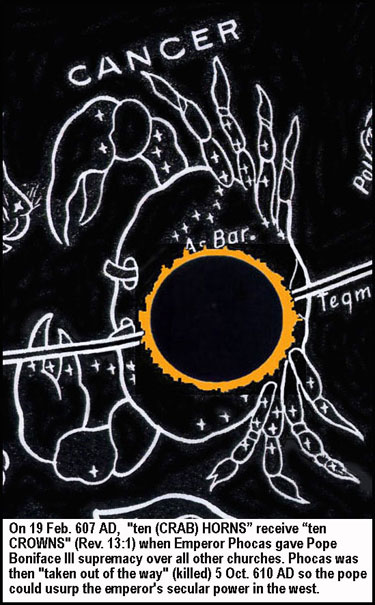
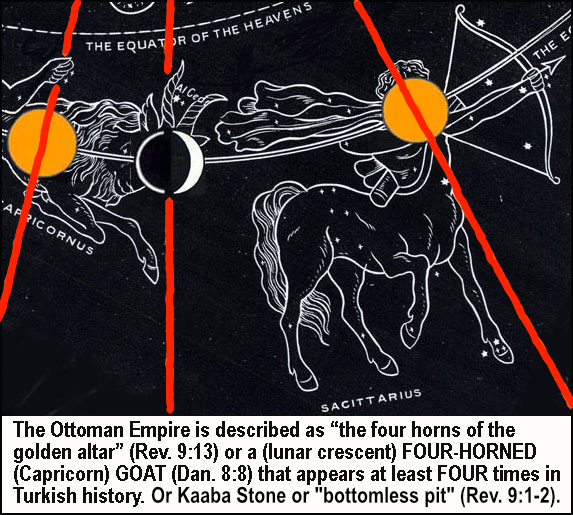
Does God Use Mocking and Sarcasm in the Bible?
"Nimrod" or "Rebel" was probably a parody or nickname given to Ninus (eg Nineveh) or En Marduk ("King Rebel") by the oppressed Shemites. Other instances of this kind of sarcasm in Scripture can be found. Thus "Babylon ("Gate of the Gods") became "Babble" ("Confusion") and "Nahash", the brazen "serpent" in the wilderness, was called by Hezekiah, in contempt, "Nehushtan" or "a piece of brass." when he broke it in pieces (2 Ki. 18:4). Antiochus Epiphanes ("God manifest") became Antiochus Epimanes ("madman"). The shameless and obscene Priapus is referred to as Peor (Num. 23:28; 25:18; 31:16; Deut. 3:29; 4:46; 34:6; Josh. 13:20; 22:17) -- a dishonorable term used only by Jews, never by heathen authors -- because it probably means "Opener of the vagina" since his huge Phalli are carried in procession. Herodotus assures us the Phallus was movable (Euterpe). Lucian explains that it had the most obscene posture. Hebrew "paar" can also mean "stretch open the anus" because Jews used an indecent posture before the idol and offered him dung, pretending this was the proper worship for that idol (p.126, vol. 2, Universal History ... From Original Authors). Even Baal-zebub, the god of Ekron, meaning "lord of flies", perhaps is in mocking derision of Baal-zebaoth -- "the lord of armies" which may have been the idol's real name. Another "god" known as "Cush" came to mean "Chaos" and "Chaos is chaotic" (Jer. 1:2). The Israelites, in expressing the name of idols, regarded rather the sound than the letters, and thus entirely deftroyed the sense. Instead of Beth-Zan, the temple of the Sun, they wrote, the temple of the tooth; instead of Beth Aron, the temple of the Ark, the temple of anger; and inftead of Air- Ares, the city of the Sun, the city of destruction.
"And God said unto Abraham, As for Sarai thy wife, thou shalt not call her name Sarai, but Sarah shall her name be. And I will bless her, and give thee a son also of her: yea, I will bless her, and she shall be a mother of nations; kings of people shall be of her. Then Abraham fell upon his face, and LAUGHED, and said in his heart, Shall a child be born unto him that is an hundred years old? and shall Sarah, that is ninety years old, bear? And Abraham said unto God, O that Ishmael might live before thee! And God said, Sarah thy wife shall bear thee a son indeed; and thou shalt call his name Isaac (LAUGHTER): and I will establish my covenant with him for an everlasting covenant, and with his seed after him" (Gen. 17:15-19)
Aaron excused his IDOLATRY with this explanation: "And I said unto them, Whosoever hath any gold, let them break it off. So they gave it to me: THEN I CAST IT INTO THE FIRE, AND THERE CAME OUT THIS GOLDEN CALF" (Ex. 32:25).
"And the Lord opened the mouth of the donkey, and she said to Balaam, "What have I done to you, that you have struck me these three times?" Then Balaam said to the donkey, "Because you have made a MOCKERY of me! If there had been a sword in my hand, I would have killed you by now." The donkey said to Balaam, "Am I not your donkey on which you have ridden all your life to this day? Have I ever been accustomed to do so to you?" And he said, "No." (Nu. 22:28-30) Just as Balaam struck his donkey three times for doing her duty, so also Balak chided greedy Balaam three times for doing his duty (Numbers 22-24). WHO WAS THE REAL DONKEY? Balaam doesn't even seem fazed that he is suddenly arguing with his donkey. Remember, Eve conversed with a snake.
“Thus says the Lord: We have heard a cry of panic, of terror, and no peace. Ask now, and see, CAN A MAN BEAR A CHILD? Why then do I see every man with his hands on his loins like a woman in labor? Why has every face turned pale?" (Jer. 30:5).
"Therefore thus saith the Lord; Ye have not hearkened unto me, in proclaiming LIBERTY (Jubilee release), every one to his brother, and every man to his neighbour: behold, I proclaim a LIBERTY (Jubilee release) for you, saith the Lord, to the sword, to the pestilence, and to the famine; and I will make you to be removed into all the kingdoms of the earth" (Jer. 34:17).
"About noontime, Elijah began MOCKING them. “You’ll have to shout louder than that to catch the attention of your god! Perhaps he is talking to someone, or is out sitting on the toilet, or maybe he is away on a trip, or is asleep and needs to be wakened!” (1 Ki. 18:27; TLB).
A lazy man is too lazy to lift his hand to his mouth (Pr. 26:15). He just reclines in bed, turning from side to side like a door on hinges (26:14) inventing absurd excuses for not going to work (26:13).
"Then the king's color changed, and his thoughts alarmed him; his limbs gave way, and his knees knocked together" (Dan. 5:6; RSV).
When Nineveh repented, "it displeased Jonah exceedingly (that they repented), and he was very angry. And he prayed unto the Lord, and said, I pray thee, O Lord, was not this my saying, when I was yet in my country? Therefore I fled unto Tarshish: for I knew that thou art a gracious God, and merciful, slow to anger, and of great kindness, and repentest the of the evil. Therefore now, O Lord, take, I beseech thee, my life from me; for it is better for me to die than to live. In other words, Jonah didn't like the people of Nineveh, and just knew God was going to forgive them if they repented, because He was kind and gracious. Since they did repent, and God forgave them, Jonah said, "Ok, just kill me now Lord." (Jonah 4:1-3)
When the Israelites were using the Ark of the Covenant like a good-luck charm in taking it to battle, the Philistines ended up capturing it and placed it in their temple before their idol of Dagon. They came into the temple the next day and found Dagon FLAT ON HIS FACE before the ark. They set him back up. The next morning, there he was again, but this time he had his HANDS and HEAD CUT OFF as a symbol of his powerlessness before the God of the ark (1 Samuel 5:1-5). God’s putting Dagon in a position of submission to His ark is a comical picture.
"See what they spew from their mouths— the words from their lips are sharp as swords, and they think, “Who can hear us?” But you LAUGH at them, Lord; you SCOFF at all those nations" (Ps. 59:7-8). "The wicked plots against the righteous And gnashes at him with his teeth. The Lord LAUGHS at him, For He sees his day is coming" (Ps. 37:12-13). "The kings of the earth rise up and the rulers band together against the Lord and against his anointed, saying, “Let us break their chains and throw off their shackles.” The One enthroned in heaven LAUGHS; the Lord SCOFFS at them" (Ps. 2:2-4). "He pours contempt upon princes" (Ps. 107:40). So God has a sense of humor explicitly revealed in the Bible.
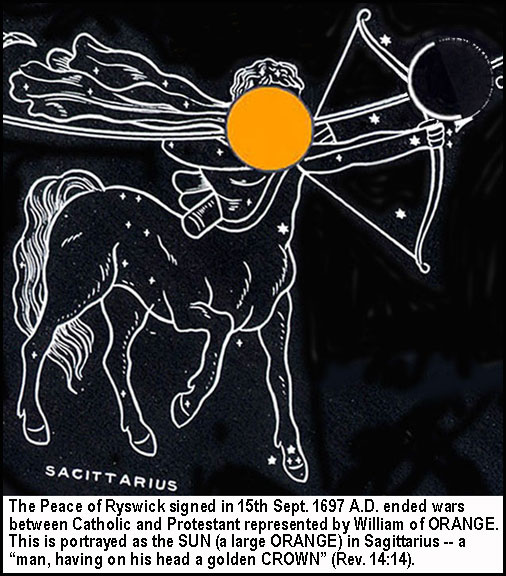
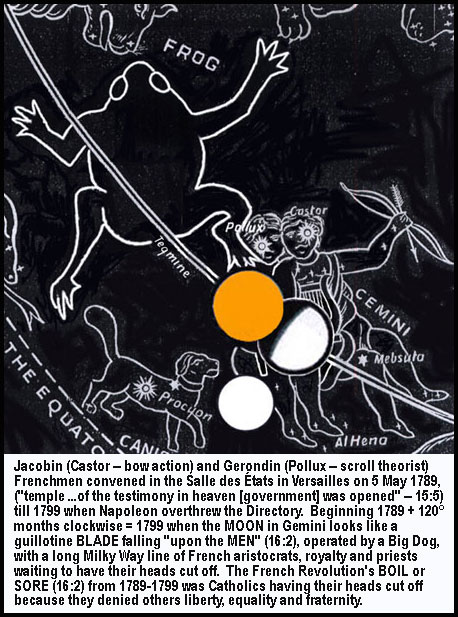
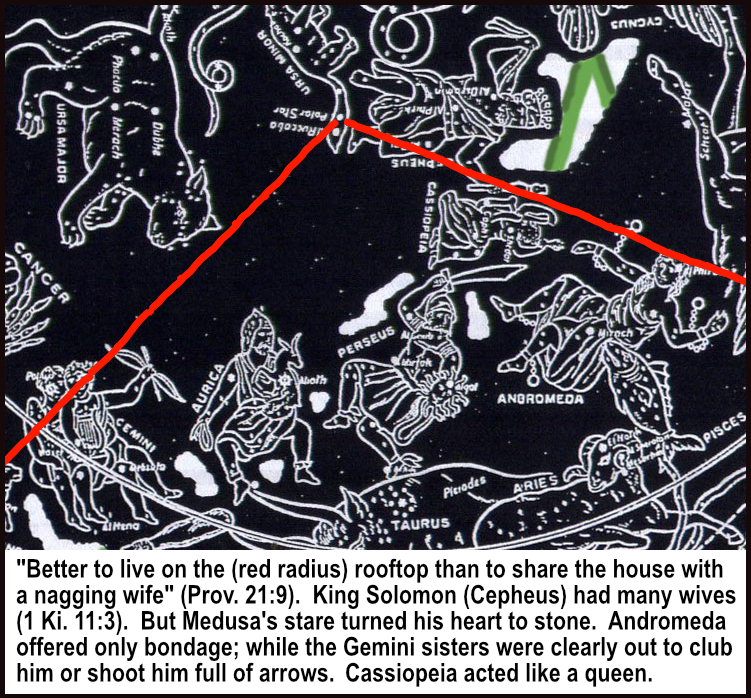
"A Merry Heart Doeth Good Like Medicine: But A Broken Spirit Dries the Bones" (Prov. 17:22)
There is "a time to weep, and a time to laugh; a time to mourn, and a time to dance" (Eccl. 3:4) Our lives
should be characterized by “soberness” (1 Thessalonians 5:6,8; Titus 2:2,6) as well as a sense of HUMOR. "A merry heart makes a cheerful countenence: but by sorrow of the heart the spirit is broken" (Pr. 15:13)
In a syndicated newspaper column, Your Good Health, Dr. T. R. Van Dellen discusses the medicinal benefits of laughter: "Laughter has a relaxing effect on the nervous system and is said to improve digestion and well-being. Although we have no proof that a hearty laugh benefits the heart, it is conceivable that laughter lowers the blood pressure when it is high and raises it when it is low. Laughter also is good exercise. When someone has a hearty laugh, the diaphragm shakes up and down and air is drawn into the lungs by means of long, deep intake and expelled in a series of bursts."
In concluding his article, Dr. Van Dellen wrote: "This (laughter) is one of our most precious possessions and those with this trait are able to ward off the buffets of the outside world and convert them into pleasure. Humor helps conserve energy that would otherwise be expended in anger, pain, horror, fear, or despair."
Pioneer researcher Dr. Edward Podolsky proved that laughter at the dinner table helps aid the digestive juices. Dr. Podolsky fed two groups of college students the same diet for two weeks. One group was "entertained" with scientific lectures. The second group was treated to the patter and monologue of a professional comedian. As expected, the group of collegians who laughed through their meals checked in with healthier, "noticeably improved digestion."
"It has been observed that a characteristic of healthy and long-lived persons is a sense of humor. It is as though their optimistic attitude were supplying a physical nourishment to their bodies -- a sort of vitamin supplement" (page 89, Man of Steel and Velvet by Aubrey Andelin).